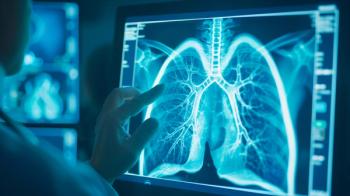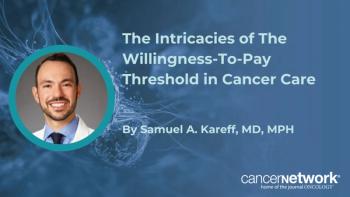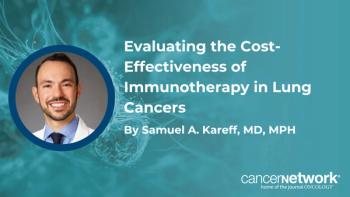
Moderate to Severe Depression Affects One-Third of Patients with NSCLC
To improve quality of life for patients with depression, researchers indicated it is crucial to provide referral and follow-up mental health care for patients with non-small cell lung cancer.
A study published in the journal Lung Cancer indicated that about a third of patients newly diagnosed with advanced non-small cell lung cancer (NSCLC) have moderate to severe symptoms of depression.1
To improve the quality of life of patients with depression, researchers suggested that it is crucially important to provide referral and follow-up mental health care to help patients to engage in and benefit from new therapies, especially given the survival benefits of targeted and immunotherapies.
“This is more than having a ‘low mood.’ When severe, the depression rarely gets better without treatment,” explained lead study author Barbara Andersen, PhD, professor of psychology at The Ohio State University, in a press release.2
In this cohort of 186 patients, 8.1% with newly diagnosed NSCLC scored at the severe depressive symptom level. Of those patients, 100% reported depressed mood and 80% reported anhedonia more days than not.
Severe depressive symptom level patient responses on the questionnaire showed a majority reported experiencing vegetative and cognitive symptoms at the level/frequency of “quite a bit” or “very much,” including 93.3% with fatigue, 86.7% with weakness, 73.3% with appetite change, 66.7% with insomnia, and 60.0% with concentration impairment. Moreover, 93.3% reported that their depressive symptoms made it difficult to do their work, take care of things at home, and/or get along with other people.
“All of these can have negative effects on treatment, overall health, quality of life, and disease progression,” Andersen said in the release. “Depression is just part of what these patients are dealing with. It comes with this whole package of worse functioning, more physical symptoms, stress, anxiety, and more.”
More than 70% of patients with newly diagnosed NSCLC and severe depressive symptoms also had moderate to severe/severe generalized anxiety disorder (GAD) symptoms. GAD worry or fear can be especially toxic for patients with lung cancer, given that severe anxiety can worsen dyspnea and induce panic. Further, GAD can impede decision-making and participation in or continuation of treatment.
Additionally, appreciating patients’ illness perceptions at the time of diagnosis was notably important, as negative illness perceptions are associated with patients coping less effectively, especially when having to make treatment choices. Patients with negative illness perceptions are also at an increased likelihood to delay seeking treatment or pursue aggressive therapies at end of life that have detrimental effects on quality of life.
“Some oncologists may have a mindset that ‘of course, you’re depressed, you have lung cancer.’ This may show an under-appreciation of the breadth of depressive symptoms and other difficulties which accompany it,” Andersen noted.
Upwards of 70% of patients with severe depressive symptoms reported one or more type of pain, indicating a need for pain management, or referral for, at the point of diagnosis. The co-occurrence of fatigue, weakness, and appetite changes for more than 70% of the patients could be suggestive of cachexia. Also, more than 30% of patients with severe depressive symptoms had self-care impairments. This illustrated the need to determine patients’ functional status early and follow with interventions.
Notably, patients with severe depressive symptoms reported limited access to social and financial resources. In lung cancer specifically, financial strain is associated with higher symptom burden, reduced quality of life, and earlier mortality.
There were 2 major differences between the moderate and severe groups. First, 11.5% of patients in the moderate to depressive symptom group had a moderate to severe/severe GAD score vs 73.3% patients in the severe depressive symptom group. Second, much fewer patients with moderate depressive symptoms had impairments in self-care (7.7% vs 33.3%), mobility (32.7% vs 73.3%), and usual activities (38.5% vs 100%).
Considerable evidence pointed to the likelihood that the patients reporting a severe level of depressive symptoms would be diagnosed with major depressive disorder (MDD). Once diagnosed, MDD is a psychiatric disorder which continues for months and may not remit. Significant symptom remission is not usually observed until after 2-3 months of continuous treatment, even with psychotherapy and/or pharmacotherapy.
Researchers stressed that without appropriate referral and care, patients’ understanding of their disease will be substandard, decision-making and engagement in treatment will be impaired, tolerance of symptoms and treatment side effects will decrease, and motivation and efforts to maintain functional status will deteriorate.
References:
1. Andersen BL, Valentine TR, Lo SB, Carbone DP, Presley CJ, Shields PG. Newly diagnosed patients with advanced non-small cell lung cancer: A clinical description of those with moderate to severe depressive symptoms. Lung Cancer. doi:10.1016/j.luncan.2019.11.015.
2. Depression affects one-third of lung cancer patients [news release]. Columbus, Ohio. Published December 4, 2019. newswise.com/articles/depression-affects-one-third-of-lung-cancer-patients?sc=sphr&xy=10021790. Accessed December 11, 2019.
Newsletter
Stay up to date on recent advances in the multidisciplinary approach to cancer.
Related Content




Evaluating the Cost-Effectiveness of Immunotherapy in Lung Cancers
















































